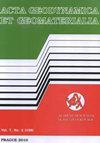基于自适应检测阈值和fnn衍生电离层延迟补偿的GPS/BDS三频周跳检测与修复算法
IF 0.8
4区 地球科学
Q4 GEOCHEMISTRY & GEOPHYSICS
引用次数: 1
摘要
针对高电离层扰动下的GPS/BDS无差观测数据,提出了一种改进的三频周跳检测与修复算法。该方法选择了3个与GPS/BDS系统线性无关的最优观测值组合。利用“计算-预测机制”估计的剩余电离层延迟,即灵活地决定是由观测者自己计算延迟还是由前馈神经网络(FNN)预测延迟,对检测值进行补偿。此外,我们设计了一个基于实际噪声水平的自适应检测阈值来检测周跳,并采用改进的最小二乘去相关调整(MLAMBDA)来固定整数周跳。利用2 d地磁风暴周期30 s采样率下的观测数据对算法进行了性能测试。结果表明,在电离层扰动较大的情况下,该算法可以检测和修复小至一个周期的各种周期滑差。尽管很少发生误判,但不会产生假修复。文章信息文章历史:接收日期2019年12月7日接收日期2020年2月4日在线发布日期2020年4月16日本文章由计算机程序翻译,如有差异,请以英文原文为准。
GPS/BDS triple-frequency cycle slip detection and repair algorithm based on adaptive detection threshold and FNN-derived ionospheric delay compensation
A refined triple-frequency cycle slip detection and repair algorithm for GPS/BDS undifferenced observables under high ionospheric disturbances is proposed. In this method, three linearindependent optimal observables combinations for GPS/BDS are selected. The residual ionospheric delay estimated from a “calculation-prediction mechanism”, namely flexibly determine whether to calculate delay by observables themselves or to predict delay by a feedforward neural network (FNN), is used to compensate for the detection values. Additionally, we devise an adaptive detection threshold based on actual noise level to detect the cycle slip, and adopt the modified least-square decorrelation adjustment (MLAMBDA) to fix integer cycle slip. The performance of the proposed algorithm was tested with observables at 30 s sampling rate in a 2-day geomagnetic storm period. Results showed that the proposed algorithm can detect and repair all kinds of cycle slips as small as one cycle in the case of high ionospheric disturbances. No false repairs are generated despite the occurrence of very few misjudgments. ARTICLE INFO Article history: Received 7 December 2019 Accepted 4 February 2020 Available online 16 April 2020
求助全文
通过发布文献求助,成功后即可免费获取论文全文。
去求助
来源期刊

Acta Geodynamica et Geomaterialia
地学-地球化学与地球物理
CiteScore
2.30
自引率
0.00%
发文量
12
期刊介绍:
Acta geodynamica et geomaterialia (AGG) has been published by the Institute of Rock Structures and Mechanics, Czech Academy of Sciences since 2004, formerly known as Acta Montana published from the beginning of sixties till 2003. Approximately 40 articles per year in four issues are published, covering observations related to central Europe and new theoretical developments and interpretations in these disciplines. It is possible to publish occasionally research articles from other regions of the world, only if they present substantial advance in methodological or theoretical development with worldwide impact. The Board of Editors is international in representation.
 求助内容:
求助内容: 应助结果提醒方式:
应助结果提醒方式:


